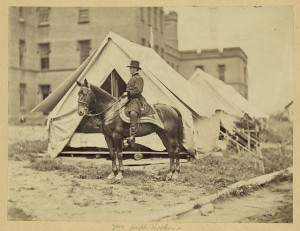Back in July a disgruntled General Joe Hooker resigned from his command of a corps in General William T. Sherman’s army group. As the 1864 political campaign heated up, Republicans must have been happy to hear that General Hooker was still in favor of a vigorous prosecution of the war.
From The New-York Times September 22, 1864:
Major-Gen. Hooker on the Situation.
To the Editor of the New-York Times:
I lately had the pleasure of a half-hour’s interview with that glorious old soldier and patriot, popularly known as “Fighting JOE,” at Waterhouse, N.Y. As copperheads and traitors have been trying to torture some recent utterances of his into a quasi-indorsement of their candidate’s platform, let me ask you to give place to one or two of the declarations made by him on that occasion. I said to him: “General HOOKER, what do you think of the declaration made at Chicago, that the war against the rebels has thus far been a failure?” His reply, as I recollect it, was in these exact words:
“It’s pretty much what might have been expected from the sort of people assembled there, isn’t it?” His own opinion upon that point was pretty clearly expressed in another remark made by him to this effect: “That if the Union armies did not strike another blow, but simply held their present position, the rebellion must soon crumble into ruins. He did not hesitate to avow the opinion that the rebellion was already tottering to its fail, and he spoke, in terms of amazement, and certainly with no want of either directness or force, of the semi-traitorism which he found so abundant at the North. He is for war; war to the knife; war till the last ditch is reached, and the last traitor is struck down. He seemed to pant for active service again at the front; and, certainly, the whole country will join in the wish that his earnest patriotism and generalship may soon find a suitable field for their active and successful exertion.
While my pen is in hand let me express to you my admiration of the consummate ability as well as the manly dignity with which you are conducting the present political campaign, a campaign not less momentous or important in its issues than that which is now in progress in the field with such glorious success in the past, and still more glorious results soon, as we may confidently hope, to be realized in the future. W.
Joe Hooker might have been panting for active service – he finished the war in the Northern Department of Michigan, Ohio, Illinois, and Indiana.
The last paragraph praised the Times for the way it was conducting the election campaign. 150 years ago today the Richmond Daily Dispatch critiqued a speech Times’ publisher Henry J. Raymond gave at a Republican rally in Brooklyn. The Dispatch pointed out that the U.S. Constitution does not guarantee that a majority of the people elect the U.S. president, just a majority in the Electoral College.

